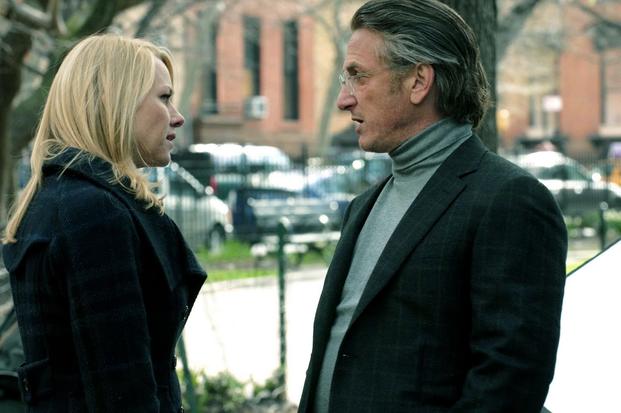Director Doug Liman's 2010 movie "Fair Game" tells the real-life story of how CIA operative Valerie Plame lost her career after her husband, Ambassador Joseph Wilson, very publicly criticized the intelligence the White House used to sell the 2003 invasion of Iraq.
Naomi Watts stars as Plame and Sean Penn as Wilson. The movie got excellent reviews on initial release but Liman thought he shot a better film than the one he released. Working in secret over the last few years, he re-edited the movie and indeed delivered an even more powerful movie than the original.
The Plame/Wilson story was a big one from the time the White House outed Plame as a CIA agent in 2003 until Chief of Staff to Vice President Dick Cheney Scooter Libby was convicted of lying to investigators in 2007.
President Trump pardoned Libby earlier this year and now the 2018 version of "Fair Game" is available for digital purchase at iTunes, Amazon, VUDU and the Google Play store. It's also coming to Netflix on November 1st, a move that should allow a far bigger audience to see the movie than saw it on original release.
Doug Liman has enjoyed a storied career in Hollywood. After making his debut with "Swingers" in 1996, he's gone on to direct much-love movies like "The Bourne Identity," "Mr. and Mrs. Smith" and "Edge of Tomorrow." He spoke to us last year about his fascinating Iraq War thriller "The Wall" and he's back to discuss his new version of "Fair Game."

What made you decide to revisit "Fair Game" after eight years?
I started revisiting it a couple years ago and I really had thought about doing it almost from the day it was released. And even thought the movie received a standing ovation at Cannes, I just knew there was a better movie there than the one we were putting out. I didn't know at the time how to find it; I just knew there was a better version.
A few years ago on my own, without telling anybody, I brought in Steve Mirrione. We cut "Swingers" and "Go" together. He went on to win an Academy Award for "Traffic." He worked with me on "Edge of Tomorrow." I brought him in and said, "Will you just take a look at this?" And together we did find a much stronger film.
That was a couple of years ago and then I was like, "All right, well, what do I do with it now?" It raises the question: When a movie has been released, does the director get to go back in and do more work on it? And then I thought, "Why not?" The world is not a fixed place and the technology changes.
Back when we made "Swingers," we were shooting on film and you actually cut the film. The last thing you do is you physically cut the film and glue it together. So that's not really changeable, but today we make films digitally. So I thought, "Who said just because it's been released, that it needs to be completed? Who said a filmmaker can't go in and decide that there's a better movie? I'm just going to recut it and put it out again."
I just went ahead and did that and then started the process on my own of technically finishing the movie. After you creatively finish editing, then you have to do sound work and color work. We're doing this and we haven't told my producers or the studio or anybody.
When it was all done this spring, I was going to approach the studio and let them know I had done this and say, "Hey, what do we do with it?" And then Trump pardoned Scooter Libby, who is one of the villains of the movie. And I thought, "Oh, you know what? The story wasn't done."
It turns out the reason the film wasn't done eight years ago is because the story wasn't done eight years ago. When the story finally finished this spring, and I went back in to the end of the film and changed the cards to reflect Scooter Libby's pardon and now the movie is done.
At what point do you tell the actors or at what point do you tell Valerie Plame and Joe Wilson that you're working on this project?
This spring and summer. Sometimes it comes up that someone's found out and they get irate at the studio, that they've heard talk of this and ask why weren't they told. I made a little bit of a mess. In fact, just last night I called Janet Zucker, the producer who initially hired me on the movie, and told her we had done this director's cut.
I mean she obviously knew. Someone had said she had given the studio an earful on why no one had called her. They're like, "Doug, you gotta call her because you made this mess. You're like a bull in a china shop." But that's always been my way in life. I act first and ask forgiveness and permission afterwards.
Even in the making of this movie, I wanted to shoot some of the scenes in Baghdad. When I made "The Bourne Identity," the story was set in Paris and I wanted to shoot in Paris. The studio said, "No, you have to shoot in Montreal." And I said, "No, the audience is paying money to go see a movie set in Paris. We should show them Paris, right?" Most of the audience won't have a chance to go to Paris themselves. They should at least be able to vicariously live through us and experience the real Paris.
I thought in the same way with "Fair Game." If some of the story is taking place in Baghdad, an audience shouldn't see Morocco or Jordan, like other filmmakers have done. They should see Baghdad, so I was determined to shoot in Baghdad.
The studio, of course, said, "Absolutely not." So I just put together a crew to go without telling them. There was a little bit of a hiatus in between filming in Jordan and Kuala Lumpur and I decided that we can fit the shoot in right there. There were flights from Jordan to Baghdad. So you know it was act first, ask forgiveness later.
In fact, the shooting in Baghdad probably had the biggest impact on my decision to re-edit the movie. I'm interested in telling stories about characters with extraordinary situations. And Joe Wilson and Valerie Plame are two characters in the extraordinary situation of taking on the most powerful men in the world.
Joe Wilson knew that the president of the United States was lying to the American people and had lied us into war. Joe Wilson was facing the decision to challenge not only a president, but a political dynasty. Because George W. Bush's father was a president and his brother was planning on being president.
I was so interested in Joe Wilson's decision to take on a political dynasty. I wanted to go back in and re-edit because I thought I could get even more out of Sean Penn's performance of Joe Wilson.
Once I started cutting the film with Steve Mirrione, it had been a number of years since I'd been in Baghdad filming. My experiences of being in a country that we had invaded while the war was still going on had a more profound impact on me than I realized at the time.
When I came back, I talked about all the crazy experiences we had there and how terrifying it was and the violence and how we wore bulletproof vests while filming. We were focused on all the adrenaline of filming there and the bad-boyness of going and doing this incredibly dangerous thing.
It took me a few years to sort of process the humanity of of the war. And that had the biggest impact on me when I went back to recut the movie and that was unexpected. I just didn't expect to be changed. I didn't expect my experience filming in Baghdad to change me because filming in Paris didn't change me. Paris is not a country that was at war.

Your original cut feels like it was a Joe Wilson and Valerie Plame movie, and the new version feels like it's more of a Valerie Plame movie.
It is. At the end of the day, the same way I was interested in Joe Wilson making the decision to take on the White House, I'm even more interested in what it was like to be Joe Wilson's wife. Your spouse makes that decision to take on the president and the havoc that it wreaked on your life and your family. How do you process that? When Joe Wilson takes on the White House, you're expecting a fight. If you're Valerie Plame, you're not expecting your husband to do something that's going to destroy your career and your life.
By the way, it didn't destroy her life because Valerie was the top of her class at the CIA. And the story she tells in the film that she couldn't be broken is true. Her classmates have all spoken to me and they did not break her during training.
When the movie originally came out, we had just lived through this Karl Rove era of incredibly disciplined messaging from the White House. They picked a story and everyone stuck to it and they were brutally efficient at getting it out there.
The Obama administration wasn't as good at that sort of thing and we're obviously in a completely different world than that now. Watching it this week, I realized all the White House messaging in the news clips seemed normal in 2010 and it seems almost unimaginable now.
It's chilling to watch it today. And I think that we all, Democrat or Republican, could stand to remember that we're all human beings. When Trump mocks Professor Ford, she's a human being. She's a wife
I just watched a film last night with an audience and Valerie Plame. All of the news clips in the film are real. Nothing is being taken out of context. Just sitting there next to the real Valerie Plame, it's kind of like if I was watching "The Bourne Identity" and Jason Bourne was next to me in the movie theater. Not Matt Damon, but Jason Bourne. It's a surreal experience to watch a story as powerful as "Fair Game." These are real people that went through this experience.

People really seemed willing to carry water for the White House during the Bush administration, as evidenced by their mobilization after Joe Wilson picked this fight. It seems like people working in the Obama and Trump administrations are less willing to follow the script. Do you think this incident inspired a change in Washington culture?
There was an op-ed piece in The New York Times a month ago or two months ago attacking the president. It was done anonymously. I have to think that the last time somebody took on a president like this was Joe Wilson.
You can't help but watch "Fair Game" and think about what is it like then and what it's like now. In Sean Penn's performance as Joe Wilson, there was an indignation that the White House would lie. He's screaming that they lied when he's talking to his friend at the State Department. The White House had lied.
It's so naïve like looking at it from the filter of today, because who would be surprised today that the White House lied? The people in the White House are so powerful. When you see the tools that they have at their disposal used so ruthlessly against Joe Wilson and Valerie Plame, you know they're the same tools being used today on critics of Trump.
Let's talk about the release of this new cut of the movie. It's out on digital at a very low price but not DVD or Blu-ray and it's going to be on Netflix next week. It seems like far more people are going to see "Fair Game" now than had a chance to see it in 2010.
Yeah, I'm expecting far more people to see the film today than saw it initially. I've always liked technology and I've always felt that as a filmmaker we need to adapt. Some of the things we do are based on old technology.
When I was shooting "Swingers," it was a very technical thing, but people always backlit their actors. That was left over from when people shot movies in black and white, when you needed to separate people's dark hair from the walls.
We've been shooting in color for 50 years and we're still lighting movies the old-fashioned way. That little technical experience has stuck with me in terms of every aspect of filmmaking. Technology has changed and we're still doing things based on old technology. The very act of re-cutting a movie and releasing a different version of the movie is very much something you can do today because of technology.
A film is not set in stone today the way it was set in stone ten years ago. I'm not going to do it, but I could change the film a week later after it goes on Netflix. I can just swap it out. Because of how things are distributed now, there is the opportunity to change how filmmakers tell stories and what it means for a film to be finished. I'm grateful that technology changed and I'm able to take advantage of that and find a home for the director's cut of "Fair Game."





